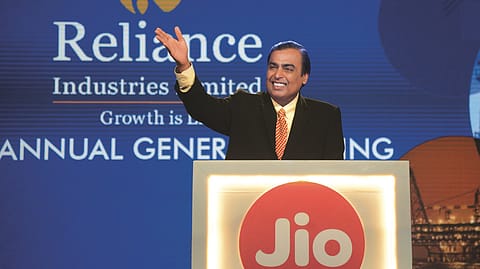Jio Price Hike: Reliance at all time high
As regulatory changes reduce losses and price hike promises more revenue, analysts are predicting better days ahead for the Reliance stock.

In what appears a respite for its competitors, Reliance Jio Infocomm has hiked tariffs for its telecom services, the third time since its launch in February this year. Despite the increase, the average revenue per user (ARPU) will work out to Rs 141, half of what it had originally said it wanted to achieve.
With the increase, the most popular plan which promises unlimited voice usage and a data consumption of 1GB/day for 84 days will cost Rs 459, a hike for Rs 60. The company has also reduced the benefit under Rs 509 scheme, which offers 2 GB of data per day, by reducing its validity or billing cycle from 56 to 49 days.
The tariffs are effective October 19. Shares of Reliance Industries, the parent company which owns Reliance Jio, hit an all-time high of Rs 929.95 in early trade on Monday and analysts attribute the rise to positive news flow on the Jio front. Says an analysts with domestic brokerage house: “Slowly but surely, the uncertainly over Jio is clearing out and if, Jio becomes cash positive in the near future, the stock can go up 50% in one year.”
In the last one year, the Reliance stock price has gone up nearly 100% - a rally that started shortly after Jio’s services was launched informally and for free. Analysts at that time re-rated the stock saying that the launch of Jio took away uncertainly around the project, which was delayed by 24 months and has costed the company over Rs 150,000 crore without earning the company a rupee in revenue. The company’s market capitalisation is now at Rs 605,000 crore and is again the most valuable company in the country.
The tariff increase comes after the reduction of Interconnect usage charges (IUC) last month by the Telecom Regulatory Authority of India or Trai. The IUC charges, which Jio had to pay everytime its customers made voice calls to another network, worked out to Rs 2100 crore in the September quarter. This added to directly added to Jio’s losses as all voice calls on its network are free for its customers. The cut in IUC from 14 paise a minute to 6 paise a minute will result in a saving of Rs 3800 crore for Jio, estimate analysts.
It is not immediately clear how many of Jio’s 130 million will eventually renew their subscription or adopt the new plans. Before the new plan came into force, the company had allowed a seven day window starting October 12 when existing customers could renew their plans at old rates. The renewal would come into force only when their existing plans expired.
As a bonus for renewal, the company provided eight discount vouchers worth Rs50 each to customers who recharged Rs 399 between 12 and 18 October. More clarity on the success of the new plan will be evident only at the end of the third quarter in December 2017, which is expected to be amongst the worst quarters for the incumbent players like Airtel, Vodafone and Idea.
Recommended Stories
However, the prospect of an end of a tariff war has also bought good cheer to telecom stocks. As Reliance inched up to its all time high, on Monday, Bharti Airtel moved by smartly by Rs 23 or 4.80% to Rs 496.75 and Aditya Birla-owned Idea Cellular moved up by Rs 6.80 or 7.23% to Rs 97.80. These firms, hit by the impact of goods and services tax, or GST, and a 57% cut in interconnection usage charges (IUC), have been posting increased losses after Jio launched it services.